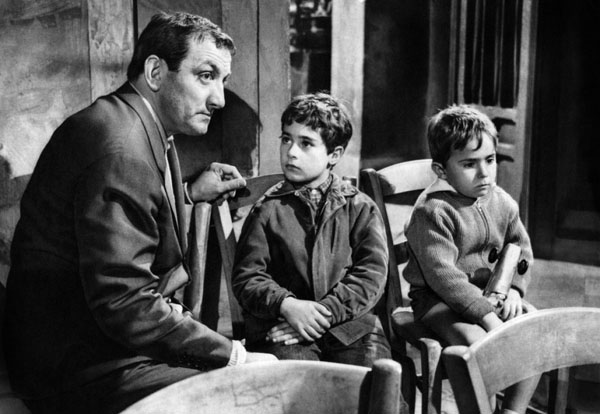“There are careers that become trapped in the cracks of film history, caught between officially canonized movements and schools of critical thoughts, glossed over precisely because they defy easy categorization,” writes Scott Foundas, introducing the BFI’s new season, Claude Sautet: The Heart of Things, opening today and running through October 8. “Such is the case of Claude Sautet (1924-2000), a contemporary of the ‘nouvelle vague’ but never part of it, who was still making commercial genre films as Godard and Rivette were taking hammer and sickle to the very syntax of cinema. He was also a storied ‘script doctor’ who made contributions to the likes of Eyes Without a Face and Borsalino, before finding his true métier with a series of triangulated romantic dramas that could be collectively grouped under the title of the most famous one: The Things of Life.”
BFI programmer Geoff Andrew introduces the opening film: “Like Melville’s Le Deuxieme Souffle and Becker’s Le Trou, Claude Sautet’s [Classe tous risques (1960)] was based on a novel by death-row-inmate-turned-writer José Giovanni. Though seldom screened in recent years, it is undoubtedly their equal, a truly great crime movie deserving of wider renown.” And, at the top of a list of “10 great French gangster films,” Matthew Thrift notes that Classe tous risques “swiftly fell from circulation in the wake of his star Jean-Paul Belmondo’s bigger success that same year: Jean-Luc Godard’s À bout de souffle.” But “Sautet favours the psychological character study over the transatlantic cultural exchange adopted by many of his peers. That’s not to say the film is without event: the alarming daylight robbery in its opening moments alone sets in motion a propulsive forward momentum soon to be laced with tragedy.”
“A story of friendship, revenge and betrayal in a crime ring, it stars Italian actor Lino Ventura, who looks like the ex-wrestler he really was,” notes the Telegraph‘s David Gritten. “He plays Abel Davos, an infamous Paris gangster, sentenced to death in absentia but now on the run in Milan. He wants to return home with his wife and two young children, and plans ‘one last job’ to pay for the trip…. Abel needs help from his old partners in crime—but they all find self-interested reasons not to rescue him. Instead they send Eric Stark (Jean-Paul Belmondo), a young thug who helps Abel to get home for no reason beyond their growing friendship. Belmondo is electrifying: somewhat less cool and stylish than he appeared in Breathless…, he’s still compelling, and he and Ventura make a great double act.”
“I have a particular, even personal, relationship with this film,” wrote Bertrand Tavernier for Criterion back in 2008. “I experienced a shock of discovery when I first saw it and felt driven to write my first review about it. It was a short article, as the editor had requested, and probably superficial—I was young—but it was laudatory. It ended, ‘People say Classe tous risques is a B movie. Better B like Boetticher than A like Allégret.’ … That first article was followed by my first interview…. Classe tous risques marked ‘the beginning of a beautiful friendship’ that remained without a cloud, unwavering, until Sautet’s death. A double friendship, really, for some time later José Giovanni also became an important part of my life.”
Also for Criterion, N.T. Binh notes that Sautet worked closely with Giovanni “to press home what he found most compelling in this story based on the life of a real person: the downfall of a once all-powerful crime boss who winds up at ‘the bottom of the barrel.'” Sautet’s work as “a clandestine adviser and script doctor… led François Truffaut to nickname Sautet ‘the mender of French cinema.’ … Solitude, violence, and corruption are the standard crime film ingredients that constitute the shadowed side of Sautet’s world, but this sense of imminent danger actually permeates his entire body of work, running beneath the surface of even his lightest films.”
Classe tous risques is “a deeply cynical and pulverizingly bleak film,” writes David Jenkins in Little White Lies, “one which talks of a lack of ethical backbone present in postwar Europe rather than merely among its band of crooked players.”
“Classe tous risques is a cracking hard-boiled thriller,” writes the Guardian‘s Peter Bradshaw. Five out of five stars. More, briefly, from Trevor Johnston (Time Out, 3/5) and Geoffrey Macnab (Independent, 4/5).
For news and tips throughout the day every day, follow @KeyframeDaily on Twitter and/or the RSS feed. Get Keyframe Daily in your inbox by signing in at fandor.com/daily.




